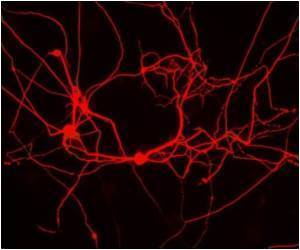Direct evidence that a specific neurotransmitter receptor is vital to the process of pruning synapses in the brains of newborn mammals was provided by Jackson Laboratory researchers.

Soon after birth, mammals' brains undergo significant development and change. Initially, large numbers of synapses form between neurons. Then, in response to stimuli, the synaptic connections are refined—some synapses are strengthened and others eliminated, or pruned.
In most synapses, glutamate serves as the neurotransmitter, and NMDAR, a major type of post-synaptic glutamate receptor, was previously known to play an important role in neural circuit development. Previous research has implicated the importance of NMDARs in pruning, but it remained unclear whether they played a direct or indirect role.
Zhang and colleagues focused on the thalamus, a brain region where synapse pruning and strengthening can be monitored and quantified with relative ease. They got unexpected help when they realized the mouse model they were using had thalamus cells lacking NMDARs right next to cells with normal NMDAR levels.
The researchers showed that the refinement process was disrupted in the absence of NMDARs. At the same time, neighboring neurons with the receptors proceeded through normal synaptic strengthening and pruning, clearly establishing the necessity of NMDARs in postsynaptic neurons for synaptic refinement.
"Whenever I give a talk or meet colleagues," Zhang says, "the first question that comes up is whether the NMDA receptor is important. It's good that this is now settled definitively."
Advertisement
Source-Eurekalert








